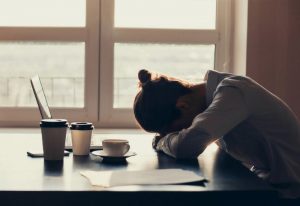Many people report such symptoms as brain fog, fatigue and trouble sleeping after they have had Covid-19. In some people, these symptoms last well after the primary Covid-19 symptoms have disappeared. University of Manchester, United Kingdom, researchers conducted a study based on the medical records of nearly 12 million people in the UK to see whether or not those specific symptoms were, in fact, linked to Covid-19. According to the researchers, the results of their study, published in the open access medical journal JAMA Network Open, do suggest prior infection with Covid-19 linked to sleep problems, fatigue and brain fog.
Results Indicate Covid-19 Linked to Sleep Problems

The results of the study done by the University of Manchester researchers revealed an interesting association between Covid-19 and lingering problems with sleep and fatigue. The researchers found that fatigue was five times more likely to be an ongoing issue for those who had been infected with Covid-19 than those who had not. Sleep disorders were also more likely to occur in those who had gotten Covid-19 than those that didn’t test positive for the illness. Three times as many people with a positive Covid-19 test were diagnosed with a sleep disorder within six weeks of their positive Covid-19 test. The age group most likely to experience sleep problems and fatigue was from 60 to 69 years of age, and women were more likely to be impacted by fatigue and sleep issues than men.
It is worth noting here that prior to this University of Manchester study, other studies have linked brain fog to insufficient and poor quality sleep, as well as to Covid-19. Thus, the higher rate of lingering sleep problems associated with having had Covid-19 could be an important factor in the brain fog that is also associated with having Covid-19.
Sleep quality itself changes as we age, notably with less time spent in deep, restorative sleep as we grow older — an interesting consideration in the context of the UK study finding that older people are the most likely to experience lingering sleep problems after contracting Covid-19. Another study has shown an increased risk of insomnia in the six months after recovering from Covid-19.
Researchers Consider Possible Role of Inflammation
While the University of Manchester researchers acknowledge that they do not yet know the specific mechanisms involved in the links between Covid-19 and sleep problems and fatigue, they do have theories they are considering. Dr. Matthias Pierce, Ph.D and a co-author of the study, suggests that inflammation may play a role, pointing to the inflammatory responses typical of severe viruses. These inflammatory responses can continue for quite a while after the acute phase of an infection passes. Further research is needed to determine the specific relationship between lingering fatigue and sleep problems and Covid-19.
What the Study Means to You
There is a lot to be learned from the University of Manchester study. It offers actionable information you can use to improve your recovery experience when contending with a viral infection like Covid-19. Knowing that fatigue and sleep disruption could be a possibility gives you the opportunity to be proactive about protecting your sleep quality, reducing the risk of fatigue and brain fog.

Smart Supplement Use
A healthy diet and healthy habits are always the best course of action. However, there are some times that using supplements are a smart way to bridge gaps, allowing you to better meet health and well-being goals. These are typically transition points, such as when working to improve health habits, for example switching to a healthier diet, or when getting over an illness that has put a strain on your usual inner resources. A melatonin supplement may be a smart choice for a while after recovering from Covid-19 to help you make sure that you are getting the good quality sleep you need to be at your best.







